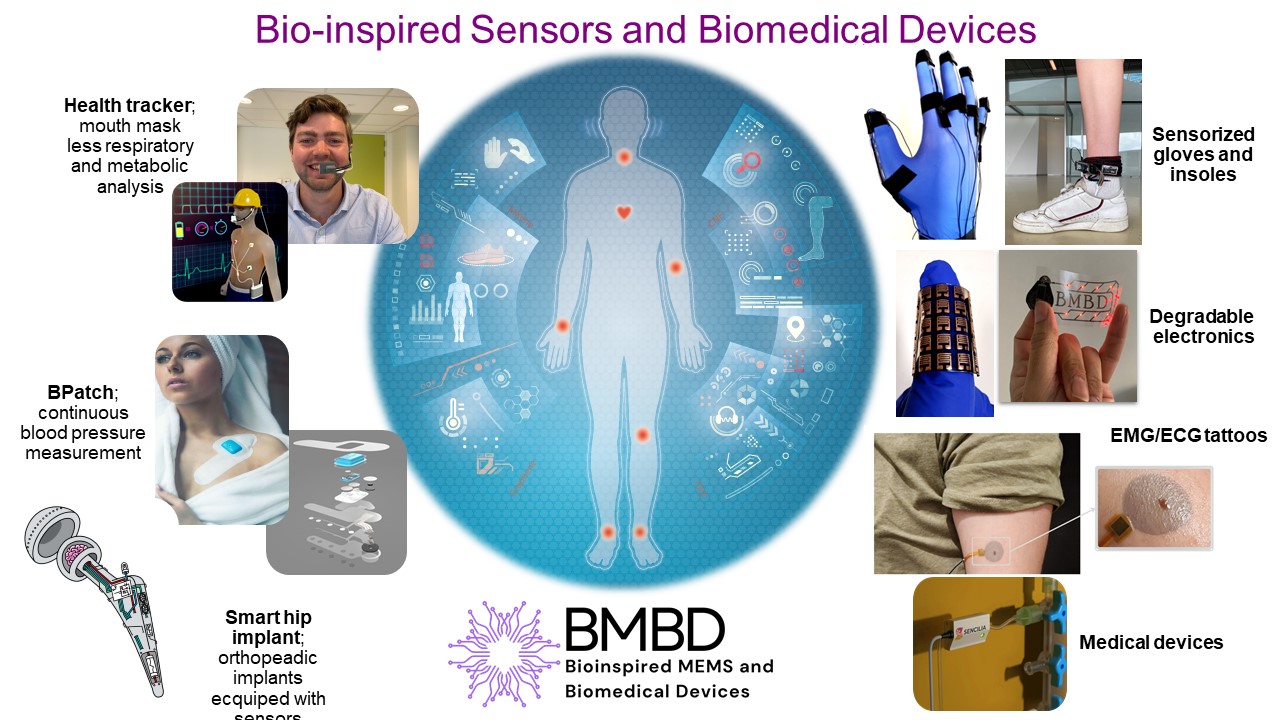Bio-inspired MEMS and Biomedical Devices

Bio-inspired MEMS and Biomedical Devices (BMBD) research unit's research mainly focuses on nature-inspired micro/nano sensors, biomimetic materials and sensors, micro/nano electro mechanical systems (MEMS/NEMS), flexible and wearable electronics, 2D sensing materials, IoT, biomedical and health monitoring sensors/devices.
|
Telephone
|
+31 50 363 8116 |
|
Postal address
|
Prof. A.G.P. Kottapalli
University of Groningen
Nijenborgh 4 9747 AG Groningen The Netherlands |
|
Secretary
|
Bio-inspired MEMS
A key aspect of BMBD’s research work is to develop MEMS/NEMS sensors with ultrahigh sensitivity and accuracy by imbibing designs of biological sensors in nature. The research team implements the biological sensory designs in artificial MEMS/NEMS sensors by mimicking the sensing principle, morphology, material properties and functionality to fabricate sensors with ultra-sensitive sensing abilities. The research scope spans from fundamental scientific research involving understanding the form and functionality of the biological sensors seen in nature towards multidisciplinary engineering research involving the micro/nano fabrication of biomimetic MEMS sensors for health technology applications. The two-pronged novel outcomes of the design and nanofabrication of nature-inspired MEMS/NEMS sensors include (i) providing fundamental new insight into the hitherto unexplored sensing mechanisms of biological sensors in nature, and (ii) the development of state-of-the-art biomimetic self-powered, ultrasensitive MEMS/NEMS sensors with applications in healthcare and biomedical sensing.

Wearable sensors
The field of wearable sensors involves the design and development of artificial-skin like flexible, stretchable, wearable/implantable sensors that find make real-time human motion monitoring, sensorized prosthetics, active patient biofeedback and advanced bionic skins a reality. This is possible through design and fabrication of flexible active sensing materials such as piezoresistors, piezoelectrics and piezocapacitors through state-of-the-art electronic printing technologies such as 3D printing, bioprinting, inketprinting and electrowriting. The MEMS and wearable electronic sensors developed in our research group are applied in biomedical sensing and monitoring, home-based health monitoring, human physiological function and movement monitoring, rehabilitation, safe clinical practices and improving standards of clinical care in hospitals.
Societal Impact
BMBD aims to create societal impact by translating the biomedical and wearable devices developed by the research team through the cycle of bedside-to-bench-side-to-bedside, through exploration of pathways to bring the stechnology developed by the group to real-use through innovation, collaboration with societal partners and creation of start-ups founded by the team members.
| Last modified: | 06 February 2025 3.46 p.m. |
